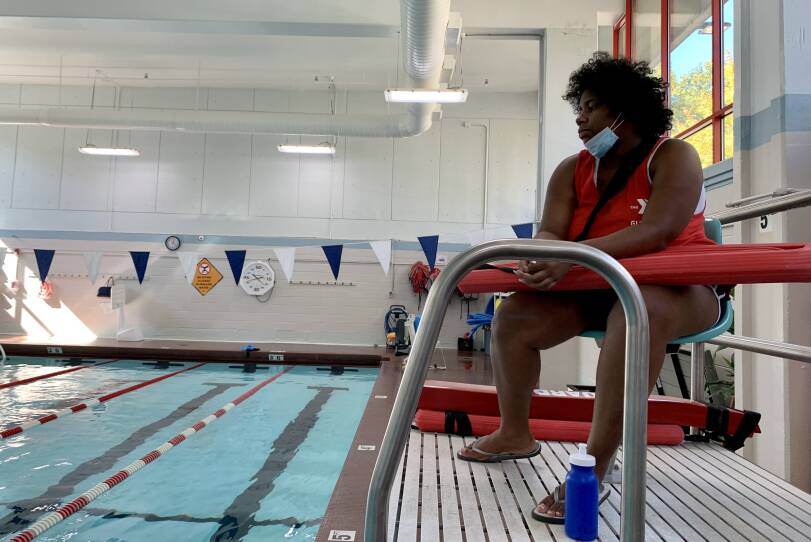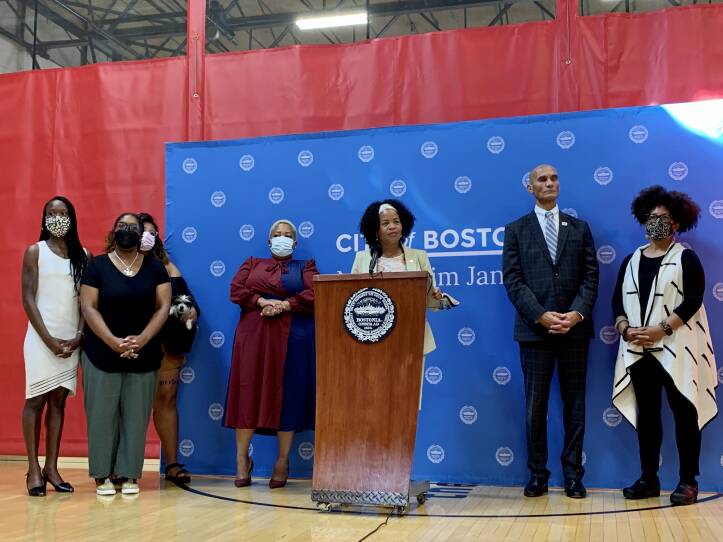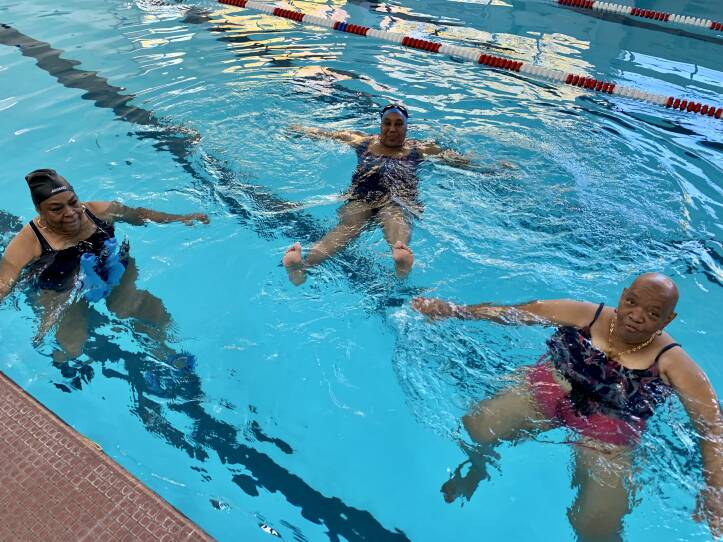Erica Depina watches a group of swimmers bob around in caps and goggles at the Roxbury YMCA pool, her eyes focused, hunched over slightly in the stance of a seasoned lifeguard. The 20-year-old Dorchester resident, who oversees water aerobics classes and teaches swimming to preschoolers at the Y, learned to swim just three years ago.
“Where I grew up in Cape Verde, there are plenty of people that don't know how to swim and are afraid of the water,” Depina told GBH News, adding that if it hadn’t been for a program through the Urban Science Academy in West Roxbury, she may have never learned. “Not many schools in Black communities have programs for students to learn to swim.”
Acting Boston Mayor Kim Janey Wednesday launched a program designed to make more people from Roxbury, Dorchester, Hyde Park and surrounding communities comfortable with swimming, as part of an effort to reduce swimming accidents and lower racial and economic barriers to lessons.
The Swim Safely Partnership, funded by investors in the mayor’s Joy Agenda program and Blue Cross Blue Shield of Massachusetts, will offer free swimming lessons at YMCA locations in Roxbury, Dorchester and Hyde Park.
“We are working to dismantle structural racism,” Janey announced at the news conference at the YMCA on Martin Luther King Blvd., “and we are welcoming all people to swim safely in our pools and on our beaches.”

The initiative comes five years after the death of Kzyr Willis, a seven-year-old boy from Dorchester who drowned at a South Boston day camp in 2016.
“Responding to the need for swimming lessons will not only increase safety,” Janey said, “but also provide additional opportunities and co-benefits, such as enhanced health benefits for children and adults.”
The program will provide free swim lessons for 300 children and lifeguard training for 60 high school students. The first lessons begin November 1, with more to be added in monthly phases, according to James Morton, the president and CEO of the YMCA of Greater Boston.
“We're all talking about different aspects of making sure that there is equity in the water,” Morton told reporters, “so that our children can have access to the beachfront, 47 miles of shoreline for the city of Boston that we should have access to.”

Last year, a swim cap favored by Black athletes was banned from the Tokyo Olympics after FINA, the swimming governing body, announced that the Soul Caps, a larger swim cap designed for people with “long and voluminous hair,” did not meet its requirements for competition.
After facing public criticism, FINA said in a statement in July that the use of the caps is under review. “FINA expects to make its consideration of 'Soul Cap' and similar products part of wider initiatives aimed at ensuring there are no barriers to participation in swimming,” the statement reads, “which is both a sport and a vital life skill.”
As part of the initiative in Boston, Janey says her administration will provide “swim caps that work for everyone,” including Soul Caps.
“Black girls are less inclined to swim due to the lack of swimming caps designed to protect their hair from chlorinated water,” Janey said. Quoting author Heather McGhee, Janey emphasized the history of racial segregation in swimming pools across America.
“'In the 1950s and the 1960s, white officials and communities across the country opted to drain public swimming pools rather than integrate them,'” Janey recited. “'Generations later, America still hasn't recognized that racism has a cost for everyone, but our future can look different.'”
Cultural considerations were a significant factor in discussions about implementing the program, according to Roxbury YMCA Executive Director Kathryn Saunders.
“I see some of the kids who, you can tell, they've been told not to get in the water because it's dangerous, which it can be,” Saunders told GBH News. “But how do you approach it and how do you look at water safety in a different way? Those things are passed down for sure.”
Saunders says educational programming and community discussions will also factor into the program.
“Some of those cultural issues are hair, skin,” Saunders said. “It's thinking ahead of time and asking some of those questions, not just, 'oh, some folks of color don't swim,' but what are some of the barriers and what can we do ahead of that to have those conversations?”

Across the hall, under Depina's watchful eye, Kimberly Battle wrapped up her water aerobics class, floating on her back in the same pool where she taught her son to swim 35 years ago.
“Back then, I don’t believe a lot of people were sending their kids to pools, for fear of the water,” Battle, 68, told GBH News. “I think a lot of people are fearful of the water. I know a lot of people from the islands who were always told to stay away from the water. They’re here now, they have this opportunity — but they’re fearful.”
That includes Beatriz Lites, a 66-year-old Roxbury resident who has been attending the water aerobics class at the Y for some 25 years — but still can’t swim, and wears a flotation belt to every class.
“In Honduras, my parents were fearful of the water and they never let me go in the sea,” Lites told GBH News. “I’m still scared of the water, but not as much.”
Lites took classes at the Y to conquer her fear, but stopped during the pandemic.
“I haven’t taken anymore classes since then,” Lites said. “But now, maybe I will.”








